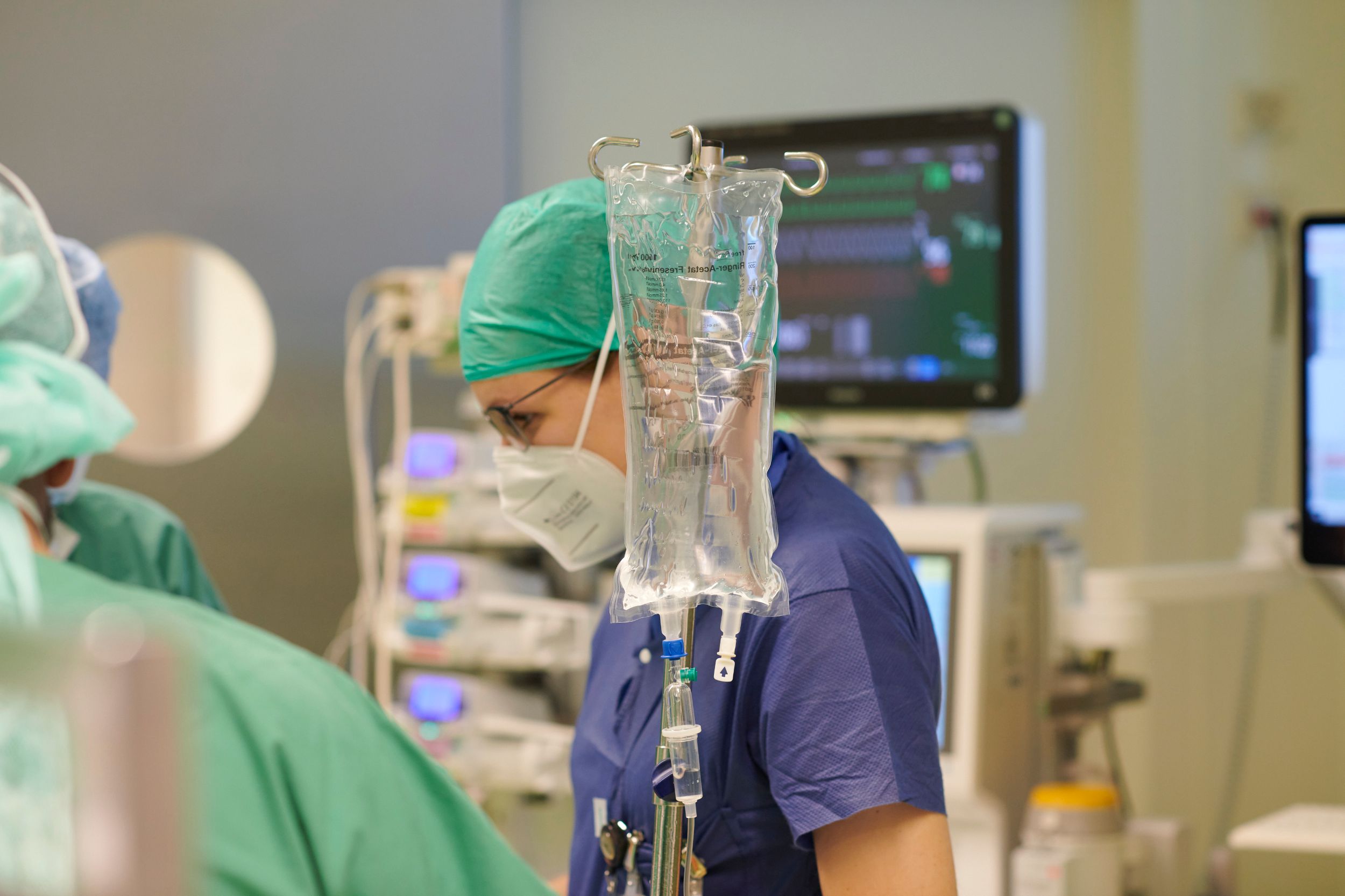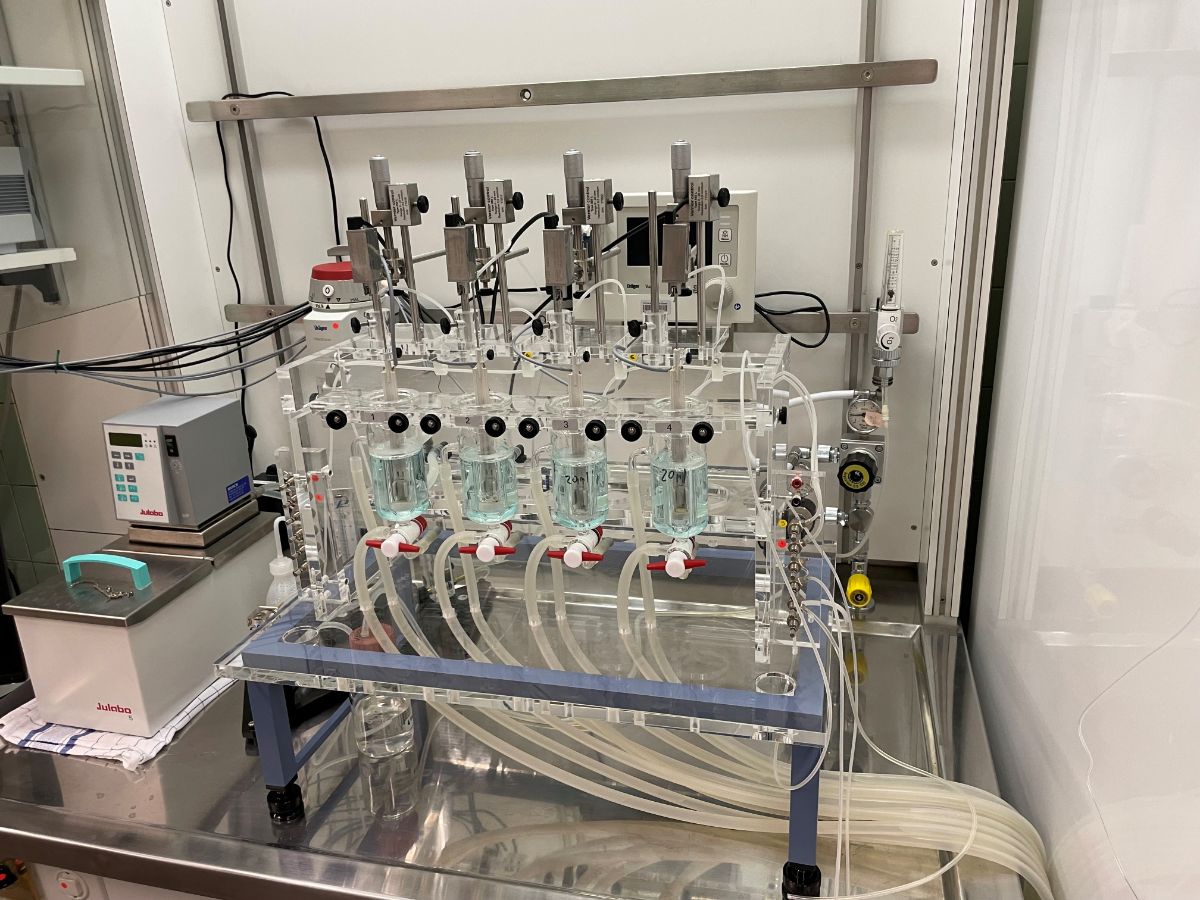Anfrage an das MH-Zentrum

Malignant hyperthermia
Swiss Malignant Hyperthermia Diagnostic Center
The Malignant Hyperthermia Diagnostic Center in Switzerland was founded by the Department of Anaesthesia at the University Hospital Basel in 1986. We are the only MH Diagnostic Center accredited by the European MH Group for Switzerland and neighboring countries. At our center, we offer a personal consultation in the MH consultation hour, where all MH diagnostic options can be offered. This includes bothmuscle biopsy, as well as genetic testing. We also offer advice on plasma or pseudocholinesterase deficiency. The MH Diagnostics Center is run jointly by the Anaesthesiology and Medical Genetics departments.
In an acute MH emergency, dial our number: you will be connected to an anesthesia specialist at the University Hospital Basel. Please note: this is an emergency number. For information and administrative questions, please use the contact form.

We can offer all options for malignant hyperthermia diagnostics. Basically, there is testing with a muscle biopsy, the in-vitro contracture test and a second, genetic method. Both tests are carried out in Basel, for the muscle biopsy you have to come to Basel for an outpatient operation, for the genetic test blood can be sent to Basel.

The team of the Swiss Malignant Hyperthermia Diagnostic Center


You can reach us at +41 61 328 64 93 or via email at mhschweiz@usb.ch
Documents
Frequently asked questions
What is malignant hyperthermia?
Malignant hyperthermia (MH) is an inherited predisposition. People who are predisposed to MH sensitivity react to certain anesthetic drugs with a massively increased metabolism. The triggering drugs are inhaled anesthetics and the muscle relaxant drug succinylcholine. If such a condition is not recognized quickly and treated correctly, it can lead to death. This is where the name "malignant hyperthermia" comes from. "Malignant" means "malignant" because the MH episode can lead to death, although this is relatively rare today. "Hyperthermia" is the "rise in temperature" or fever, which can reach temperatures of over 42 degrees.
The predisposition to MH lies in the muscles. On contact with the triggering medication, the entire musculature is activated uncontrollably. This leads to an extreme increase in metabolism. This leads to a very strong increase in oxygen consumption and at the same time heat is produced by activating the muscles.
Where can I get tested for MH?
The Swiss MH Diagnostic Center at the University Hospital Basel also holds all the results of tests carried out and the associated family information. Many additional genetic tests have been carried out in recent years and these results are also stored at the MH Diagnostic Center.
Molecular genetic tests are also offered or organized by the Swiss MH Diagnostic Center Basel. This ensures that people who undergo tests in Basel benefit from the stored data and can count on optimal professional treatment and information. Because the MH-Diagnostik Zentrum Basel maintains contacts with other MH-Diagnostik centers worldwide, appointments for examinations in other countries can also be arranged there. The results obtained there can be incorporated into the family trees of our database and thus benefit the whole family.
Who is tested for MH?
The standard test for MH is the open muscle biopsy and the in-vitro contracture test. Approximately three grams of tissue are taken from the thigh muscles and tested at the MH Diagnostic Center. This Europe-wide standardized test is complex and is only offered in Switzerland at the MH Diagnostic Center in Basel. As the removed muscle must be examined immediately in a special nutrient solution at the MH Diagnostic Center, the muscle can only be removed at the test site. The operation to remove the muscle must therefore take place in Basel.
Since 2001, MH diagnostics can also be carried out using molecular genetic methods in certain cases. The genetic basis of MH is extremely complex and therefore genetic testing only makes sense for people with a known MH-causing gene mutation in the family. If this mutation cannot be detected, the possibility of MH susceptibility cannot be ruled out. In the absence of the MH mutation, a muscle biopsy must be carried out in Basel.
Who should be tested for MH?
Anyone who has experienced a suspected MH anesthetic incident should be tested for malignant hyperthermia. Relatives of MH-susceptible persons should also be tested - depending on the degree of relationship.
Where is genetic testing carried out?
You do not have to travel to Basel for the genetic test. You can also have the blood sample taken by your family doctor and send it to us by A Mail.
It is important that you contact us before you have a blood sample taken. The genetic test is not always possible.
Where is the muscle contracture test carried out?
The muscle contracture test must be carried out at the University Hospital Basel. This is the only MH center in Switzerland. As the muscle must still be able to move during the examination in the laboratory, not too much time must elapse between the removal and the laboratory test.
How can I order an MH card?
MH ID cards are only issued to people who have been tested as MH-susceptible. An exception is made for children who cannot yet be tested and for pregnant women. Cards can be ordered here.
The test variants for malignant hyperthermia
If you register for MH testing, we will always clarify whether you are eligible for genetic testing or whether a muscle biopsy is necessary
Muscle biopsy (in-vitro contracture test)
For the muscle biopsy, you will need to come to Basel for an outpatient operation. In the in-vitro contracture test, small pieces of muscle are examined in the laboratory. The muscle pieces are suspended in small strips in a test bath and stimulated with an electric current. The current stimulates the muscle so that it twitches every two seconds. This twitching serves as a check that the muscle is still responsive.
A drug is then added to the test bath and the muscle's reaction to it is checked. We need halothane (an anesthetic drug) and caffeine as test drugs. Both drugs cause the muscles of MH-sensitive people to contract. If the muscle contracts at a certain concentration of halothane and/or caffeine of 0.2 grams or more, the test is considered positive, i.e. MH sensitivity is present.
This test is very time-consuming and takes two people several hours to complete. The test must be carried out immediately after the muscle has been removed so that the muscle is still able to contract. For this reason, the muscle extraction must take place in Basel.
Incidentally, the caffeine used for the test is in a concentration that is not reached when drinking coffee (espresso, ristretto, etc.). MH-sensitive people can therefore drink coffee without any problems.
It isimportant to mention that you must provide us with current diagnoses and current medication when you register for the diagnostics. It is also important that no other surgical procedure has been carried out in the 3 months prior to the test (with the exception of minor skin procedures)
Daily routine muscle biopsy
Muscle biopsies are usually performed on a Friday. Here is a summary of the usual daily schedule:
- Unless you have been given a different time, you should arrive at the short-stay surgical clinic at the University Hospital Basel by 6.45 at the latest.
- The short-term clinic is located in Clinic 1, on the 1st floor west. It is best to use the entrance at Spitalstrasse 21, where there is also an information desk.
- You must arrive sober, i.e. you should not have eaten anything after midnight. You are allowed to drink clear liquids until 05.30 am. This means no lattes and no breakfast.
- You will be allocated a hospital bed at the short-stay clinic.
- You will be visited by a member of the anesthesia team and informed about the anesthesia/surgery procedure.
- You will then be asked to hand in the consent form for the operation and anesthesia that you signed at home.
- If your operation is not planned as the first procedure, the exact time of the operation can unfortunately not be predicted. It is therefore quite possible that you will have to wait a moment.
- As soon as the operating theater is ready, you will be wheeled into the operating wing in your bed.
- Monitoring will be installed in the operating theater. This includes: heart monitoring (ECG), blood pressure measurement, oxygen content in the blood (oxygen saturation). You will also receive an infusion into a vein (usually in the hand).
- With your consent, blood will also be taken, which we would like to use for genetic tests as part of MH research.
- Local anesthesia (regional anesthesia) will then be prepared and administered.
- First, the groin area is disinfected and then covered with a sterile cloth.
- The skin is locally anesthetized with a fine needle (local anesthesia).
- The nerve that supplies the thigh (femoral nerve) is then blocked in depth. We use an ultrasound device to locate the nerve.
- As soon as the local anesthetic has been injected, the leg is positioned for the operation and disinfection of the surgical area begins.
- In the operating theater, the surgical area is then covered with sterile drapes. A 'curtain' is also installed for sterility reasons. This means that you cannot watch the operation (i.e. above all, you do not have to watch).
- Before the operation, we will test your leg again to see if it is insensitive. If you can still feel anything despite the regional anesthesia, we can inject you with a painkiller or administer a general anesthetic.
- General anesthesia would of course be administered with medication that is safe for MH-sensitive people.
- If you wish, you can listen to music during the operation. You will be looked after by an anesthesia specialist throughout the procedure.
- After the operation, we will take you to the recovery room, which you will soon be able to leave.
- You will return to the same room on the day surgery ward. At midday you will be given a light lunch and in the afternoon we will inform you of the results of the muscle biopsy.
- At around 5 p.m. you will be accompanied home again.
- You are not allowed to "actively participate in road traffic" on this day, i.e. you will need an escort to take you home
Genetic testing
Genetic testing is advantageous because you do not have to travel to Basel to have your blood taken (although you can do so during the pharmacogenetic consultation). The second advantage is that no operation is necessary for the muscle biopsy. There is therefore no post-operative discomfort and no loss of working hours.
However, genetic testing also has disadvantages: genetic testing is generally only useful if a genetic change (mutation) causing MH has already been found in your family.It is therefore important to know that a negative genetic test requires a muscle biopsy and an in-vitro contracture test to rule out or confirm MH susceptibility. If you register for MH testing, we will always clarify whether you are eligible for genetic testing or whether a muscle biopsy is necessary
If you have a question, please get in touch with us.

.jpg)